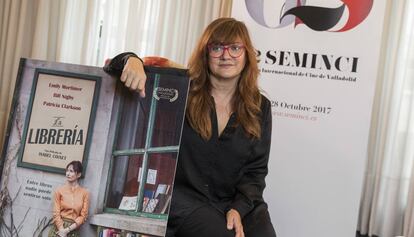Isabel Coixet: “They’re throwing us out of Catalonia”
Movie director expresses bitterness about independence bid at premiere of her new film

She looked tired, sad, and worried on Saturday morning. As she tried to talk about life and cinema, the Prime Minister and his cabinet were in the process of activating Article 155 of the Constitution, a move which will lead to the removal of Catalan regional premier Carles Puigdemont from power.

Isabel Coixet opened the Valladolid International Film Week, held in the northwestern city in Spain, with her movie La librería, or ‘The bookstore,’ which is a beautiful story of the love of books and the struggle to hold onto ideals in difficult situations.
Speaking about the movie during those painful moments full of uncertainty, Coixet wanted to highlight the moral compass of the film and the idea of empathy for an adversary: something she admits she has always found in reading. Some see her film as an allegory for the situation in Catalonia, but the director from Barcelona upholds that it is a universal story that goes much further than current events.
I am a nuanced person and the situation we are living through now seems to have no room for nuances Director Isabel Coixet
“They’re throwing us out of Catalonia. I often think about the possibility of leaving Catalonia. If you leave, it’s because you’ve been kicked out. Perhaps the only thing holding me back, although its childish, is the satisfaction that me leaving would give some people,” said Isabel Coixet in an interview with EL PAÍS, while highlighting the “strange schizophrenia” that the independence movement has brought to Catalan society.
“I often think I must be more thick skinned than I believe because I haven’t collapsed yet,” she adds as she recounts how she she was insulted on the street before running into a couple who embraced her while crying and thanking her for her condemnation of the crisis.
“It affects me a lot, my health too. I have bouts of anguish, but I’m not the only one. At this time, there are many people in a state of deep anguish and sadness, in a state of uncertainty. It is very difficult to live this way every day,” adds the director. “Right now in Barcelona, it is very difficult to breathe and think,” says Coixet who denounces the harassment she and many others have suffered for airing their beliefs.
There are so many things to talk about besides Catalonia. I want to talk about the world<span>Director </span><span>Isabel Coixet</span>
“I am a nuanced person and the situation we are living through now seems to have no room for nuances. They label you persona non grata despite the fact that I protested against the police brutality on October 1. But it’s not just me. They are sweeping us away and it is not something that has just started. All this comes from a long way back, from the moment you proclaim that bilingualism is something to be treasured. In Catalonia, there has been a lot of silence for many years, but also a huge amount of idleness and lack of work on the part of the PP government [of Spanish Prime Minister Mariano Rajoy],” continues the director who says that the only ones benefiting from the situation are the Chinese with the increase in flag purchases. And psychiatrists.
Her teenage daughter is struggling to deal with the situation too, while her mother has a deep Catalan pride, but a passion for Salamanca, the university city in Castile and Leon. Coixet has not broken ties with her pro-independence brother, because they respect each other’s opinions, but they have stopped talking about Catalonia. “It's okay, there are so many things to talk about in the world,” she says relieved. “I want to talk about books, movies, food, stores and shopping. I want to talk about butterflies. I want to talk about the world.”
But it is The bookstore which has won the prize for the best literary adaptation at the Frankfurt Book Fair, that most concerns Coixet. It is very close portrait of her character and her dreams. The film is based on the novel by English writer Penelope Fitzgerald, co-produced between Spain, the United Kingdom and Germany, and starring Emily Mortimer, Patricia Clarkson and Bill Nighy. It tells the story of a young widow who decides to open a bookstore in a small town in England and the obstacles she faces with the people in the town. In the end, they throw her out of town and she leaves.
Coixet says the only people benefiting from the situation in Catalonia are the Chinese with the increase in flag purchases, and psychiatrists
When she read Penelope Fitzgerald’s novel, whose daughter, Tina, traveled to Valladolid to attend the film’s premiere, Coixet saw herself in Florence Green, the main character. “Her reactions, naivety, and not weighing up how much you face up to really evil people in life. Her passion for books, which is one of my shelters. In all this, I see myself very clearly,” says Coixet who has changed the end of the novel – “too nihilistic” – to give the story a little light and hope. Light and a hope that she herself needs.
English version by Debora Almeida.
Tu suscripción se está usando en otro dispositivo
¿Quieres añadir otro usuario a tu suscripción?
Si continúas leyendo en este dispositivo, no se podrá leer en el otro.
FlechaTu suscripción se está usando en otro dispositivo y solo puedes acceder a EL PAÍS desde un dispositivo a la vez.
Si quieres compartir tu cuenta, cambia tu suscripción a la modalidad Premium, así podrás añadir otro usuario. Cada uno accederá con su propia cuenta de email, lo que os permitirá personalizar vuestra experiencia en EL PAÍS.
¿Tienes una suscripción de empresa? Accede aquí para contratar más cuentas.
En el caso de no saber quién está usando tu cuenta, te recomendamos cambiar tu contraseña aquí.
Si decides continuar compartiendo tu cuenta, este mensaje se mostrará en tu dispositivo y en el de la otra persona que está usando tu cuenta de forma indefinida, afectando a tu experiencia de lectura. Puedes consultar aquí los términos y condiciones de la suscripción digital.








































